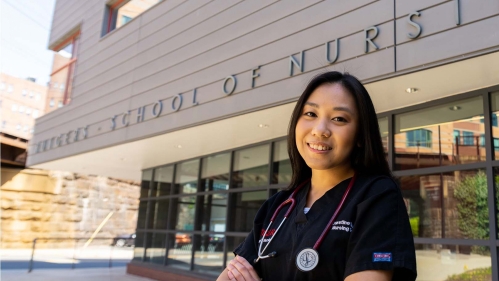Nursing Student Follows Family Tradition

Curstine Guevarra, a native of the Philippines, comes from a long line of nurses that includes her parents, aunt, uncle, cousins and other members of her extended family
It was preschool career day, and no one in her family was surprised that Curstine Guevarra chose to go to school in a nurse’s uniform with a stethoscope slung around her neck.
If there were a gene for nursing, Guevarra undoubtedly would have inherited it. She comes from a family of nurses, and that stethoscope belonged to her mother. In fact, some two decades later, Guevarra is still wielding the very same stethoscope as a student at Rutgers School of Nursing. She also put it to use as a student nurse extern in the summer of 2021 at The Valley Hospital in Ridgewood, and starting in late August, she’ll be using it in The Valley Hospital’s critical care unit as an entry-level nurse in the hospital’s Nursing Residency Program.
When Guevarra, who was born in the Philippines and immigrated to this country with her parents when she was 14, says that nursing is in her blood, she has the bloodline to prove it: Both of her parents are nurses.
The connection doesn’t stop there, however. Her mother’s brother and sister – and both of their spouses – are nurses. Her uncle’s mother-in-law is a nurse, and there are several nurses in her uncle’s wife’s family. One of her cousins is a nurse, and another is currently in nursing school. All of which can lead to some interesting discussions around the holiday dinner table. “Now,” Guevarra says, “I can finally join in our family conversations about which mask brand is better, our favorite needle gauge size, and which oxygen delivery method is the most efficient.”
Her mother and her uncle were also nursing professors back in the Philippines, and she recalls innumerable times sitting in on their lectures when she was 5 or 6 and using pages from their nursing texts as her coloring books. Long before there was a Take-Your-Daughter-to-Work Day, she would sometimes sneak into the Neonatal Intensive Care and Pediatrics units where her mother still works because she wanted to understand how those units operated. She remembers being particularly impressed with the NICU nurses, who never seemed to lose patience no matter how many dirty diapers they encountered. And she admired the way that nurses worked and the fact that even the nursing students never seemed to sit down. “I’m also that type of person,” she says. “I have to be up and moving.”
In fact, one of the things she loves most about nursing is the adrenaline rush that goes along with the job, especially during an emergency. For her last semester of nursing school, Guevarra was placed in the emergency department at The Valley Hospital, and she relished the challenge of responding to code strokes (assessments to ascertain whether patients are suffering stroke), triaging patients and assisting the team in performing their duties in urgent situations.
“I like being front and center to help the nurses figure out what’s going on,” she says.
She also relishes being needed and giving her all to patients. “I love it when people depend on me,” she says.
Currently, she’s working as a patient care associate in the hospital’s medical surgical unit, helping nurses with basic facets of the job like assisting patients in activities of daily living (bathing, feeding, toileting and ambulation) and performing procedures such as EKGs and drawing blood. In the medical surgical unit, most of her patients can talk and interact with her. But in critical care, home to the very sickest patients, many aren’t even aware she’s there – which, for Guevarra, makes working in the unit even more rewarding.
“In the medical surgical unit,” she explains, “patients need me, but not as much as they do in critical care. In critical care, they depend on me, and I like that. I want to be there for my patients.”
Given her take-charge attitude, it should surprise no one that Guevarra has been a student leader. In high school, she helped establish the photojournalism department of the school’s student newspaper and she was also a member of the student council. At Rutgers, she was a public relations co-director of the Rutgers Student Nurses’ Association and later, president of the School of Nursing’s New Brunswick student senate. When a friend suggested she take on the presidency, she gave the idea a few days’ thought, then said, “Okay, I’ll give it a try.” “Surprisingly,” she remarks, “the school year is almost over and I’m still the president.”
She’s also a member of a student organization known as the American Association for Men in Nursing. Sitting in on her first meeting with the group, she liked the fact that it sponsored volunteer events like charity walks and opportunities to contribute to community organizations like food pantries and diaper banks. She was also eager to support men in nursing, like her father, uncle, and cousins, because, she says, “we only have so many, and we want to keep them in the profession.”
Her involvement at Rutgers has set her apart.
“Curstine has been a great student as well as an active student leader," said Laura Stone, senior student program coordinator in the School of Nursing's Student Engagement department. "She has led with integrity and has advocated for her fellow students at every turn.”
Guevarra was grateful to be a nursing student at Rutgers during the height of the pandemic because, unlike students in many other nursing programs, she was able to get in-person, rather than virtual, clinical experience.
“Rutgers did a really good job at making that happen,” she says. She loves the constant flux of a large campus. “It’s like living in a city,” she notes. “I got to learn my street skills here.”
Guevarra said she’ll miss Rutgers, but she’s thrilled to be embarking on the career she believes she was born to pursue, and she’s eager, she says, “to make a difference in people’s lives.” “I’ve seen the great work my family has put into the profession, and I want to be able to do the same.”



